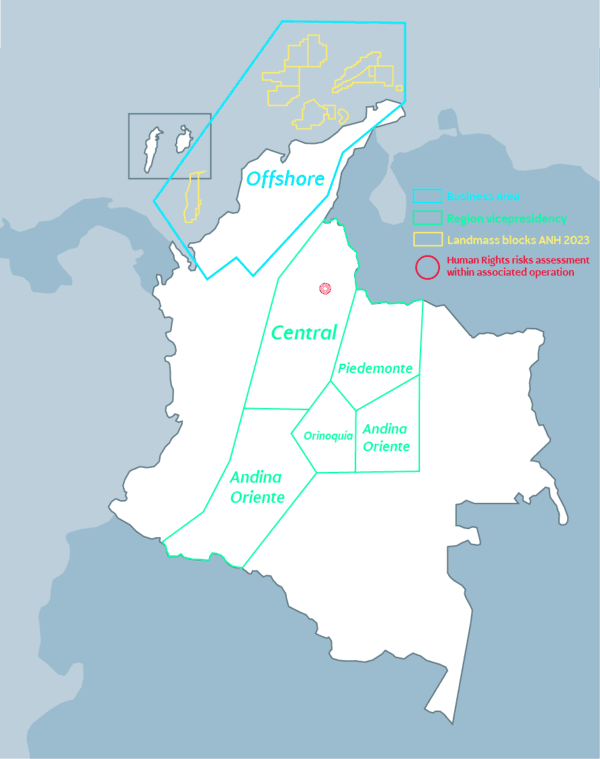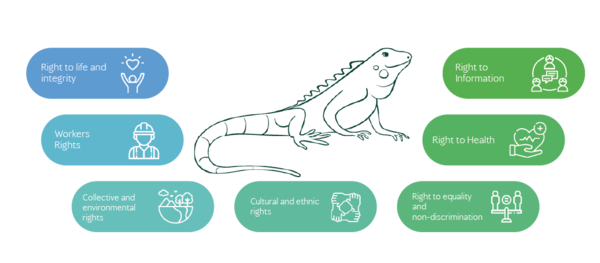 Web Content Viewer
Web Content Viewer
 buscador
buscador
 Due Diligence in Human Rights
Due Diligence in Human Rights
Due Diligence in Human Rights
Jul 24, 2024
Ecopetrol supports its due diligence, monitoring, and assessment of human rights, on its Integrated Risk Management System made up of three levels: strategic, process, and operational. It also has a Human Rights Risk Management Cycle Guide that seeks to define the criteria and processes through which human rights risks are planned, identified, evaluated, treated, and monitored. This identification is carried out in own operations and in those which involve partners or allied contractors.
Human Rights assessments and treatment plans

Ecopetrol has evaluated its main operating areas. 100% of the areas with Human Rigths Assesment have treatment plans with prevention and mitigation actions. The Company continue to working to improve and address new processes through the Human Rights risk management cycle.
Highlighted Issues
The following are the rights that, due to the nature of Ecopetrol's activities, are of particular attention in human rights risk surveys.

Grievance mechanisms
Ecopetrol has accessible internal and external channels so that all Stakeholders can express their disagreements, expectations, and needs to the Company. This is how Ecopetrol manages, analyzes, and provides a timely and quality response to their requests.
Ecopetrol recognizes that access to these channels is not a condition or impediment for those who consider to be affected, to resort to the mechanisms provided by the State, for the attention of their requests, complaints, and claims.
|
Interest groups |
Channels for filing complaints |
|
Employees, Early Retirees, Retirees and Beneficiaries (EMP) |
|
|
Suppliers Contractors and their employees (PRO)
|
|
|
Society and community (SC) |
|
|
Clients and partners |
|
Remedy
In cases where Ecopetrol identifies that it has caused or contributed to causing adverse impacts on the human rights of others, compensation or remediation of the impacts will be provided, after a individual analysis of the situation.
Making use of the principle of transparency and accountability, the Company publicly reports on prevention and mitigation actions aimed at minimizing or eliminating negative impacts on rights holders.
We invite you to review our Human Rights Special Report and Integrated Management Report for more information!
Right of Petition
What is it?
It is a fundamental right, enshrined in the political Constitution, whereby “all persons have the right to submit respectful petitions to authorities for reasons of general interest, or particular interest, and to obtain an expeditious resolution”.
Ecopetrol guarantees the right to information, and has rendered several channels available for interest groups to be able to communicate their expectations, in conformity’s, and needs to the organization. These communications are managed in order to generate a response in a timely, clear, and in-depth fashion.
What laws regulate it?
- Article 23 of the political Constitution
- Code of administrative procedure and contentious administrative procedure (acts 1437/2011 and 1755/2015)
- Anti-procedure Law (act 962/2005 and Decree 19/2012)
Who can invoke this right?
Any individual can submit respectful petitions before Ecopetrol, whether verbally or in writing, personally or through a proxy.
What procedures does it useful in?
- The recognition of a right
- Solving a legal situation
- The provision of the service
- Requesting information
- Consulting examining and requiring copies of documents
- Reporting regular facts
- Submitting complaints (manifestation of the protestation, censorship, discontent or in conformity) and claims (amending a solution vis-à-vis the undue or untimely provision of a service within the framework of an agreement)
- Submitting technical consultations
- Filing appeals with regard to decisions of the agency, inter alia
What are the terms to respond?
In accordance with the type of petition filed, response times may vary from 10 to 30 business days. This term may be expanded up to twice the initial term. The table below shows attention times under the law.
|
Type of petition |
Initial term |
Expansion |
Total term |
|
Petitions related to documents (consultation, examination or copies) |
10 Business Days |
20 Business Days |
30 Business Days |
|
Petitions for information, complaints and all other petitions |
15 Business Days |
30 Business Days |
45 Business Days |
|
Technical consultations |
30 Business Days |
60 Business Days |
90 Business Days |
Does this procedure have any cost?
Submitting a petition has no cost whatsoever; however, when document copies are required, the petitioner shall bear the cost of same.
Neither does the petitioner have to bear attorney costs to receive attention, as any citizens can act in a direct manner.
What information must the Right of Petition include?
It is not necessary to fill out any specific form in order to submit right of petition; therefore, these petitions can be filed either verbally or in writing, in compliance with the minimum requirements below:
- The designation of the authority to whom the petition is addressed. Be sure you submit your petition before the corresponding person or agency. If you do not know the name of the person to whom you should address your petition, mentioning the name of the agency – i.e. Ecopetrol S.A. should suffice in our case.
- Petitioner’s full name. In the event of acting through an attorney or representative, you should also include their full name.
- ID type and number. Foreigner citizens must include their passport or foreign ID number. Minors should include their birth certificate or underage ID number.
- The address for notifications. You can include your phone number, your fax, or your email. It is important that you do provide effective contact information for any potential clarifications and to receive your response in a timely fashion.
- The subject matter of the petition. It is necessary to specify what it is that is being required – i.e. information, a claim, a report, etc.
- Substantiate your petition. Your argumentation should be clear, concrete and explain the subject matter of your petition.
- Attach any documents as deemed appropriate to begin the procedure. In some cases, the law demands the submittal of additional documentation. For example, in the petition filed is related to ownership of the property, you will be required to submit documentation that accredit such condition of ownership, i.e. the public deed or the real estate registration number of the property.
- Petitioner’s signature. If you are petitions being submitted verbally, by email, or through the web tool for this purpose, your signature will not be necessary